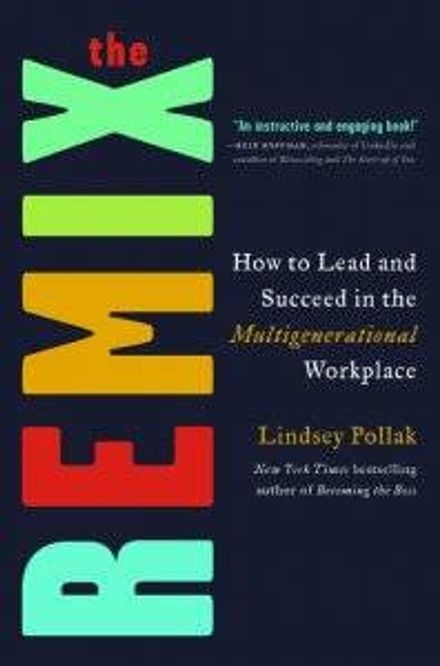How to Lead and Succeed in a Multigenerational Workforce
Advice from Lindsey Pollak, the 'Remix' author and guru on millennial workers
I have been known to roll my eyes when I tell my story about an editor several decades my junior who didn’t return my phone calls or emails–which enraged and frustrated me. Then one day, I tried texting and poof, she responded immediately. I realized that I had spent far too much energy being resentful. And by learning how to communicate, our relationship took off.


The truth is, today’s workforce is a kaleidoscope of five generations which can be tricky to navigate. But according to a recent AARP poll on the value of a multigenerational workforce, seven out of 10 adults say they like working with people from generations other than their own. To learn more about how workers and managers can do it well, I just interviewed Lindsey Pollak. She’s a Gen Xer who’s a guru on millennial workers and author of the smart new book, The Remix: How to Lead and Succeed in the Multigenerational Workplace.
In music, a remix is a well-known classic song that has been changed by a new artist to make something new. In the workplace, Pollak says, the remix means taking practices or habits embraced by a previous generation and changing them to better appeal to millennials, Gen Zs and future generations to come so that work colleagues can succeed together.
Here are excerpts from my conversation with Lindsey Pollak:
Kerry Hannon: Ricoh has new research on the so-called generational divide in the workplace which found that 71% of workers find a cross-generational workplace an asset to a company and 76% reported enjoying working alongside colleagues of different ages. Your thoughts?
Lindsey Pollak: That’s terrific. I have come across several studies that employees like to be on multigenerational teams. We are very segregated very frequently at work, and multigenerational teams are what everybody wants and what everybody needs.
"If somebody is coming to ask for a promotion at a time you perceive to be too quickly, they are probably trying to show their ambition and desire to get ahead — not trying to be entitled."
What’s your advice for 50+ managers of millennials?
Assume the best intentions. Millennials and Gen Z can — not always, but can — communicate differently and work differently and have different expectations than what we might bring to the workplace. Assume they are trying to do a good job and assume they are trying to communicate.
And have more empathy. For example, if you are annoyed that your millennial employee keeps texting or instant messaging, they are probably not trying to avoid you. It’s their natural tendency to communicate that way first.
If they are wearing ear buds in the office and you find that off-putting, they are probably trying to concentrate and get more work done rather than being unavailable to you or distracted. They grew up wearing headphones and listening to music while they did homework at school and that is how they try to be productive.
If somebody is coming to ask for a promotion at a time you perceive to be too quickly, they are probably trying to show their ambition and desire to get ahead — not trying to be entitled.
What else?

As the boss or manager, be very clear on what your expectations are. Don't make assumptions that anyone — especially younger workers — will communicate the way that you choose to communicate or would make the same decisions that you would make.
I had a law firm partner tell me that he was really disappointed by the writing skills of his junior associates. I told him he needed to be more specific and tell them what he was looking for. So he started to put together files and PDFs of what he considered to be really good writing. With so much diversity in the workplace and so much change, it is more important than ever before to show examples.
No matter what your generation, what matters is things like: My boss cares about me. The boss spends one-on-one time with me. It’s not difficult. You just have to do it.
How do you advise boomers and Gen Xers who are working for younger bosses?
As Michael Watkins and his book, The First 90 Days: Critical Success Strategies for New Leaders at All Levels recommends, with any new person you work with, have a ‘style conversation’ and say you are really looking forward to working together, ask 'What’s the best way to communicate with you? What’s the best way to get in touch with you? Any tips on reaching out when I’m in trouble? Any specific things that you look for that I might not realize?'
Ask. Instead of guessing.
I know many boomers who like to text and instant message. We have so many more ways of communicating now that you can’t make an assumption about what someone’s preference is.
What is the role of curiosity in making the multigenerational workplace succeed?
Chip Conley, the author of Wisdom @ Work: The Making of a Modern Elder, is the model for my advice. We live in times of constant change, but if you approach that with curiosity and interest, that is appealing to any generation.
People who are curious about what is new and what is interesting will thrive.
A lot of the people I interviewed for the book who are older and working with younger bosses want the energy and the change. Those who are complaining are not resisting the young people, it’s that they are resisting change. That attitude is not helpful in the current world that we live in.
A lot of younger workers don’t even notice that someone is older until that person brings it up. If the older worker is excited and energetic and passionate about an issue, that is what you are focused on, and you’re not talking about your age.
The more you draw attention to age, the more important it becomes. Not that ageism is not an issue, because it is.
Tell me about the beauty of co-mentoring.
Everybody of any age has something to contribute to your career personally, or to your work, and your team or organizational goals. The ‘remix’ is co-mentoring; the conversation goes two ways.
One manager I know would ask his millennial workers to put a new app on his phone each week. ‘I want to have the same experiences and use the same technologies that you are choosing to use, so show me,’ he told them.
When it comes to the ‘training remix,’ you say millennials will choose learning over cash. Tell me more.
Cash is important. You need to pay people a fair wage. That said, a thousand-dollar bonus compared to a skill or new coding language or managing technique that will help me grow and get my next job in our current economy has more currency.
Likewise, if you are mid-career professionally, the agility and reskilling you could receive that can keep you in the workforce for another decade or two has tremendous value. More than ever, nobody can afford to stay stagnant.
Parting thoughts?
I have empathy because there is a difference with all of these generations working together. It is not a Pollyanna world where everyone can hold hands and walk into the sunset together. You have to be proactive.


